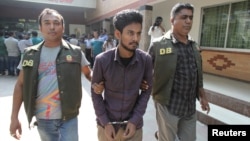Muslim religious leaders in Bangladesh say local extremist groups and the Islamic State group, which have claimed responsibility for death threats and violent attacks on minorities, are indulging in activities antithetical to the teachings of Islam.
At a conference in Dhaka, leaders of Bangladesh Jamiatul Ulama (BJU), a national body of Islamic scholars, said Islam offers protection to all non-Muslims.
“Those who are resorting to terrorism and targeting Shi’ites and church leaders in Bangladesh are un-Islamic. ... By launching terrorist attacks in the name of Islam, IS is also jeopardizing the lives of Muslims in pluralistic societies across the world,” a BJU statement said.
Maulana Fariduddin Masoud, chairman of the BJU, said that ensuring the safety of religious minorities is the duty of the majority community.
“By sending death threats or attempting to kill the church leaders, they are aiming to kill their brothers and committing un-Islamic acts," Masoud told VOA. "All those who are indulging in such activities are not just the enemy of Islam, but are also enemies of Muslims.”
This is the first time the Islamic leadership in Bangladesh has come out heavily against the extremist attacks and threats that church leaders, Shii’te Muslims and others have been facing.
'Attackers will be cornered'
Nirmol Rozario, secretary general of the Bangladesh Christian Association, told VOA the statement was heartening.
"If they continue such a stand against the attacks on us in the same spirit in the future, I am sure the attackers will be cornered in the society and will not get the chance to resort to such subversive activities,” Rozario said.
In recent weeks, more than 30 Christian clergy members and aid workers in Bangladesh have received death threats. At least three pastors have escaped attempts on their lives.
Those who sent the threats claimed they belonged to Islamic State and the banned militant outfit Jama'atul Mujahideen Bangladesh. IS also claimed responsibility for wounding an Italian priest last month in a gun attack.
In October, a bomb attack hit a Shi’ite religious procession, killing two people; police said JMB was responsible. In November, gunmen killed the muezzin of a Shi’ite mosque 200 kilometers from Dhaka.
Political party blamed
Masoud said Bangladesh Jamaat-e-Islami, the largest Islamic political party in the country, was organizing the attacks.
“Supported by Jamaat, IS and local Islamist militant groups, like JMB and ABT [Ansarullah Bangla Team], are terrorizing people, including the minorities, and killing them. The groups are wrongly presenting Islam as a ruthless and terrorist religion,” Masoud said.
Dhaka University professor Syed Hussainul Banna said attacks against religious minorities were related to the ongoing war crimes tribunal, which is hearing cases tied to the country's war for independence in 1971.
“Jamaat was involved in war crimes. Now, as this party is becoming politically weak in Bangladesh, it is trying hard to scuttle the process of the war crimes trials and stall the hangings of the war criminals, by resorting to violence and triggering a chaos,” Banna said. “Attacks on the Christians and Shias are targeted to create a deeper religious divide and chaos in the country.”
In several of their threatening letters, the Islamists accused church leaders of “spreading Christianity” in Bangladesh, where Christians constitute 0.3 percent of the population. Christian leaders strongly reject the charge.
“In 1971, the percentage of Christians in Bangladesh was 0.3 or 0.4 percent. Decades after, the figure remains unchanged. This figure must have risen if the churches were converting people,” said BCA’s organizing secretary, William Proloy Samadder.
'Excellent' ties to public
“Because of the services the churches or Christians provide in the society, we have an excellent relationship with the general public," Samadder said. "Up to 99 percent of the beneficiaries of the schools, colleges, hospitals and vocational training centers which we run are Muslim. Those who are attacking the churches do not belong to the mainstream society.”
The “micro-minority” Christian community in Bangladesh does not threaten anyone, and the attacks it is facing are unfair, Samadder added.
However, the threats continue. Barnabas Hemrom, a pastor in north Bangladesh’s Rangpur region, received a second death threat this week; his first came last month.
“Rangpur commander of IS needs five heads of those who are spreading Christianity. Your heads will be sent to Syria as trophies. Get ready, brothers. We will send you to the heaven soon,” said the threat, which came by mail on Wednesday.











